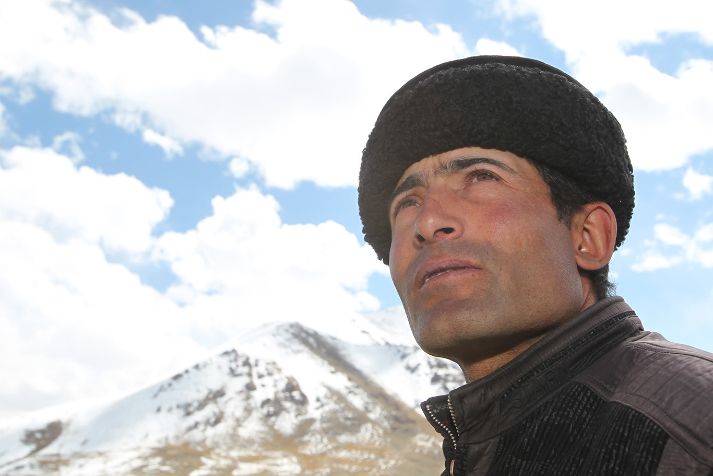| Xinjiang Today |
| The legacy of courage | |
|
|
 Border patrol officer Laqini Bayika on a patrol in Hongqilafu (Khunjerab), Kashi (Kashgar) Prefecture, on September 23, 2011 (XINHUA)
Xinjiang has seen countless heroic acts—ordinary people showing extraordinary courage in the face of danger. Laqini Bayika was one of them. On a winter day in 2021, the border patrol officer heard the cries of a child who had fallen into a river and plunged into the icy waters to save him. Though the child was rescued, the 41-year-old lost his life. But his legacy continues to inspire future generations. This year, three students saved a mother and daughter from drowning. When they were interviewed by the media, one of the students said, "Laqini is our idol" though they had never met him. In 2019, when a cargo truck caught fire, two residents of Hami City, Ma Zixi and Liu Zhanwei, rushed forward without hesitation to join others in putting the fire out. As they battled the flames, Liu was injured and Ma died. But their action, reflecting the same spirit of selflessness and courage, has ensured that their names will live on in people's memory. There is a Chinese term to describe such acts—jianyiyongwei—"acting bravely for a just cause." It originates from The Analects of Confucius, a collection of the philosopher's sayings, where he said, "To see what is right and not do it is a lack of courage." When you encounter something that is clearly righteous or just, you must act and not hold back due to the fear of being adversely affected. The idea of standing up for what is right was not just a moral teaching in ancient China, it was actually written into the law. The historical legal codes included clauses that protected and rewarded those who stepped in to help others, while addressing the inaction of those who turned a blind eye to people in danger. For example, in the Tang Dynasty (618-907), the legal code stated that if someone was committing a crime, even bystanders had a legal duty to stop the crime and hand the perpetrator over to the authorities. The law encouraged people to take action against criminals to protect both themselves and the community. In case of emergencies like fires or natural disasters, the law required people who detected the danger to alert others and help them with rescue efforts. Failing to do so could result in punishment. The Tang government also introduced rewards to encourage brave actions. For instance, if someone caught a thief or helped recover stolen goods, they would be rewarded based on the value of the goods recovered. And if a government official went above and beyond his duties to help catch a criminal, he would be rewarded, too. This legal framework combined punishment for passivity with reward for bravery, and encouraged civil involvement in maintaining social order. By turning moral duty into legal responsibility, the law helped foster a culture of justice and compassion and reflected social progress and a civilized society. This tradition continues as China's legal system still supports and promotes such acts. In 1995, following national-level decisions on improving public safety, Xinjiang established a foundation to reward individuals who demonstrate bravery in protecting others. Alongside this, guidelines were introduced to recognize and reward such people. Later, in 2012, Xinjiang introduced another set of rules focused on both rewarding and protecting those who act bravely. From 2007, the local authorities began organizing programs to visit and assist such courageous individuals, helping them and their families in case of financial difficulties. In 2013, a region-wide donation campaign called One Yuan a Month was launched, urging people to contribute a small amount regularly to support these heroes. Five years later, the regional foundation rolled out a three-year poverty alleviation plan specifically for those brave individuals and their families living in hardship. Each year, 500,000 yuan ($69,700) was set aside for things like critical medical care, education for children, job training and basic living assistance for families officially registered as needing poverty relief. Through these policies and programs, Xinjiang not only stands behind those who act bravely, but also fosters a broader culture of civic courage and solidarity. By 2024, over 280 individuals had been honored for their acts of bravery, some of them posthumously, like Laqini, who was recognized as a Model of the Times. Over 8 million yuan ($1.1 million) have been distributed among them and their families. These stories reveal the deep unity, solidarity and mutual support among people in Xinjiang, irrespective of their ethnic background. In the face of danger, they rise to the occasion, risking, and sometimes laying down, their lives to protect others. Each of these stories preserves a piece of history; each hero becomes a pillar of strength. Their actions safeguard lives and property, and carry forward the finest values of the Chinese nation. The author is an assistant research fellow at the History Institute, Xinjiang Academy of Social Sciences Comments to liwenhan@cicgamericas.com |
|
||||||||||||||||||||||||||||
|